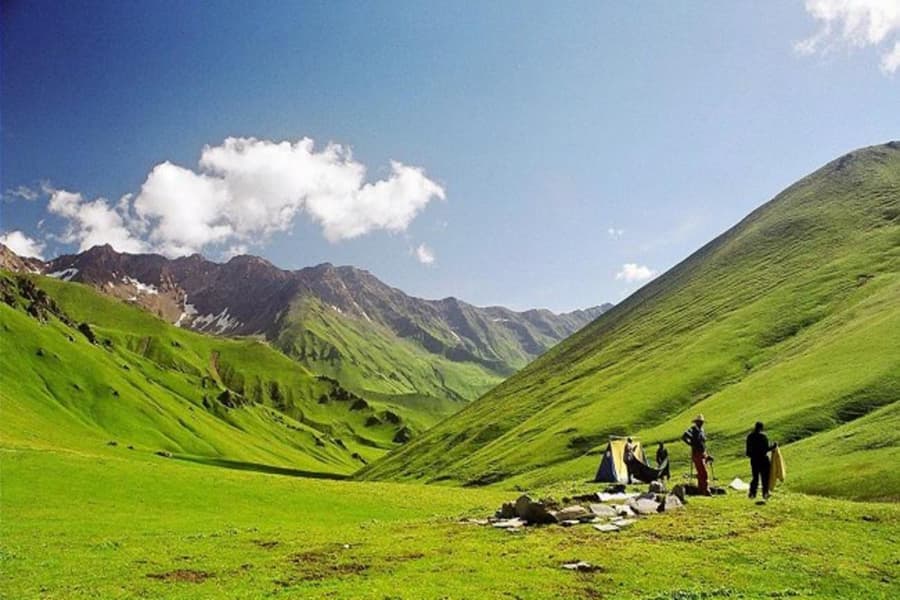The Dayara Bugyal Trek is a breathtaking journey through one of the most picturesque alpine meadows in Uttarakhand, India. Located at an altitude of around 12,000 feet, this trek offers panoramic views of snow-capped Himalayan peaks, lush green meadows, and dense forests. Whether you’re a seasoned trekker or a beginner, the Dayara Bugyal Trek provides a unique blend of adventure and natural beauty. In this guide, we’ll cover the best time to visit, difficulty level, and essential packing tips to help you prepare for this amazing trek.
Best Time to Visit Dayara Bugyal Trek
Choosing the right time is crucial for an enjoyable trekking experience. The Dayara Bugyal Trek can be done throughout the year, but each season offers a different experience:
- Summer (April to June):
- Highlights: The weather is pleasant, and the meadows are covered with lush greenery. The temperature ranges from 10°C to 20°C during the day, making it ideal for trekking.
- Best For: Trekking in comfortable weather and witnessing vibrant green meadows and blooming wildflowers.
- Monsoon (July to September):
- Highlights: The landscape becomes lush, and the meadows are at their greenest. However, heavy rainfall can make the trail slippery and challenging.
- Best For: Experienced trekkers who don’t mind the rain and want to experience the meadows in full bloom.
- Autumn (October to November):
- Highlights: The weather is clear, offering breathtaking views of the snow-capped Himalayan peaks. The meadows begin to turn golden, creating a picturesque setting.
- Best For: Photographers and trekkers who want clear skies and stunning panoramic views.
- Winter (December to March):
- Highlights: The meadows are covered with a blanket of snow, transforming the landscape into a winter wonderland. Temperatures can drop to as low as -5°C.
- Best For: Adventure enthusiasts who want to experience snow trekking and enjoy the serenity of the mountains.
Recommended Time: The best time to visit Dayara Bugyal is from May to June and September to November, as the weather is pleasant, and the trails are more accessible.
Difficulty Level of Dayara Bugyal Trek
The Dayara Bugyal Trek is considered easy to moderate, making it suitable for both beginners and experienced trekkers. Here’s a breakdown of the trek’s difficulty level:
- Trail Length: Approximately 20-22 km (round trip)
- Duration: 4-5 days, including travel time
- Altitude: Reaches up to 12,000 feet (3,658 meters)
- Trek Gradient: The trail has gradual ascents and descents, with some steep sections. The well-defined path makes it easy to follow, and there’s no technical climbing involved.
Suitable For:
- Beginners with a moderate fitness level
- Families and groups looking for a relatively short and scenic trek
- Experienced trekkers who want to enjoy a relaxed trek with stunning landscapes
Fitness Requirements:
- Basic physical fitness is sufficient. Engaging in some pre-trek exercises like jogging, stair climbing, or brisk walking will help you adapt to the trek’s demands.
Packing Tips for Dayara Bugyal Trek
Packing the right gear is essential for a safe and enjoyable trekking experience. Here’s a comprehensive list of essentials:
1. Clothing
- Base Layers: Moisture-wicking t-shirts and thermal inners
- Insulating Layers: Fleece jacket or woolen sweater
- Outer Layer: Waterproof and windproof jacket
- Trekking Pants: Quick-dry and comfortable trekking pants
- Warm Gloves and Hat: Essential for cold mornings and evenings
- Socks: At least 4-5 pairs of woolen and synthetic socks
- Rain Poncho: Especially useful during the monsoon season
2. Footwear
- Trekking Shoes: High-ankle, waterproof, and with good grip
- Gaiters: Useful for trekking in snow during winter
3. Backpack
- Trekking Backpack (40-50 liters): Spacious enough to carry all your essentials
- Daypack (10-15 liters): For carrying water, snacks, and other small items during day hikes
4. Camping Gear
- Sleeping Bag: Rated for -10°C if trekking in winter
- Trekking Poles: Helpful for maintaining balance on uneven terrain
5. Food and Water
- Water Bottle or Hydration Bladder: At least 2 liters
- Water Purification Tablets: For purifying water from natural sources
- Snacks: Energy bars, nuts, dry fruits, and chocolates
6. Personal Items
- Sunscreen: SPF 50+ to protect against sunburn
- Sunglasses: UV-protection to shield your eyes from the sun and snow glare
- Lip Balm: Essential for preventing chapped lips
- Toiletries: Biodegradable soap, toothbrush, toothpaste, and wet wipes
- First Aid Kit: Include painkillers, antiseptic cream, bandages, and altitude sickness medication
7. Other Essentials
- Headlamp or Torch: With extra batteries
- Camera: To capture the stunning beauty of the trek
- Trekking Map: Useful for navigation if you’re trekking without a guide
Pro Tip: Pack light and only carry the essentials. You may have to carry your backpack for long hours, so keep the weight under control.
Additional Tips for a Safe and Enjoyable Trek
- Acclimatize Properly: Although the trek is not extremely high-altitude, acclimatize well to avoid altitude sickness.
- Stay Hydrated: Drink plenty of water to keep yourself hydrated throughout the trek.
- Follow the Guide: If you’re trekking with a guide, always follow their instructions, especially on tricky sections.
- Respect Nature: Carry all waste back with you and avoid littering in the meadows.
Conclusion
The Dayara Bugyal Trek is an incredible experience that offers a perfect mix of adventure, breathtaking scenery, and a chance to explore the serene beauty of the Himalayas. With its moderate difficulty level, it’s accessible to a wide range of trekkers, making it one of the best treks for beginners and nature enthusiasts. By choosing the right time, preparing for the trail, and packing the essentials, you’ll be all set to embark on an unforgettable journey through the alpine meadows of Dayara Bugyal. Happy trekking!
